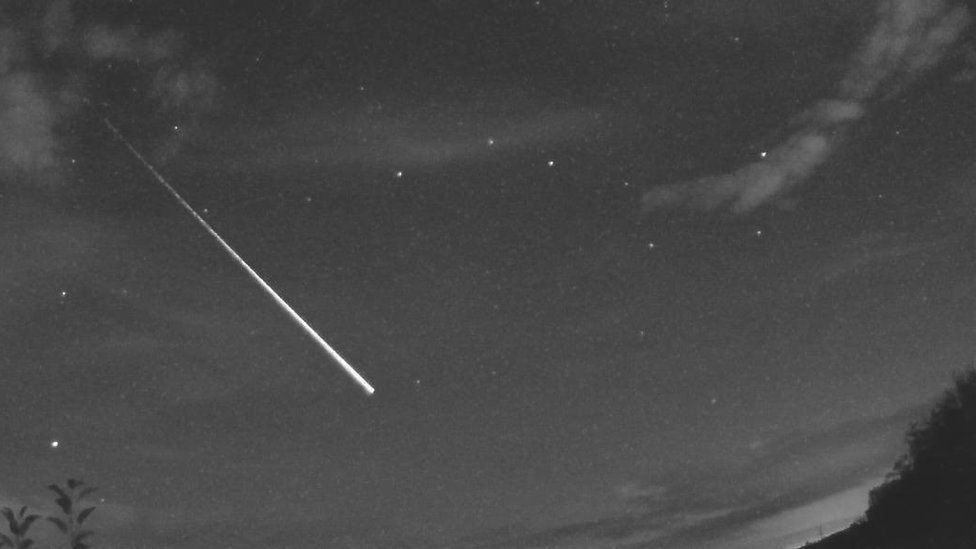A fireball seen shooting through the skies from Scotland and Northern Ireland was likely to have been space junk, experts have said.
Hundreds of people reported seeing the “shooting star” across the UK skies at around 22:00 on Wednesday evening.
Scientists are using video footage captured by the public to work out whether the object was a meteor or space junk, and where it came from.
It would have landed in the sea south of the Hebrides if it reached Earth.
Space rock that enters Earth’s atmosphere is called a meteor, but fragments that survive the journey to reach the ground are called meteorites.
Manmade objects left orbiting Earth – such as a satellite parts – are described as space junk. There are tens of thousands of pieces of space junk bigger than 10cm (4in) in orbit around the Earth and they can burn up like meteors as they enter the atmosphere.
The UK Meteor Network said it was “investigating to ascertain what the object was, meteor or space debris” but could not identify the cause of the “slow-moving meteor”, which was seen burning through the atmosphere for about 20 seconds.
Kevin Morgan, from UK Meteor Network, told BBC Radio’s Good Morning Scotland said the speed it was travelling at could indicate that it was space junk.
“It is no less exciting and really encouraging that so many people have reported and shared images that they have.”
After questioning whether it could have been part of Elon Musk’s SpaceX programme, the network of citizen scientists, tweeted: “We have checked the Starlink de-orbit and it would not have come anywhere near the UK.
“At this point we cannot find any known space junk or satellite de-orbit that could account for this fireball. We are looking at the data again.”
There have been nearly 800 reports of the fireball that was seen over UK last night. The preliminary trajectory has been calculated by the IMO and indicates that the object, which we now believe to be space debris, would have landed in the Atlantic south of the Hebrides. pic.twitter.com/skSvl0YH5Y
— UK Meteor Network (@UKMeteorNetwork) September 15, 2022
The International Meteor Organization had almost 800 witness reports from across the UK and Ireland. The majority were from Central Scotland but there were also sightings from the Black Isle and Kinnaber in the east, near Montrose and as far south as London.
Initial calculations showed the object was travelling NNE and could have landed in the Atlantic Ocean “south of the Hebrides”.
Dr Jenifer Millard, from the Awesome Astronomy podcast, told BBC Scotland the colour and slow speed of the fireball suggested it was likely to be space junk.
“If you have a look at those videos you can see it’s breaking up all the time, there are little bits coming off it, which indicates that it is quite a fragile structure and so, combined, these three suggests that maybe it is a little bit of space debris.
“That’s interesting because we weren’t anticipating anything coming down. So it really makes us think about everything that we are abandoning up there all the time.”
‘Something special’
Steve Owens, astronomer and science communicator at the Glasgow Science Centre, said the sighting was “incredible”.
“I was sitting in my living room at exactly 22:00 and I saw out of the widow due south this brilliant fireball – this meteor – streaking across the sky,” he said.
“I could tell it was something special. I could see through broken cloud that it was fragmenting – breaking apart with little bits coming off it.
“Normally if you see a meteor or a shooting star, they are just tiny little streaks of light lasting a fraction of a second but this one was streaking across the sky for at least 10 seconds, probably longer.

UK Meteor Network
“It travelled from due south all the way across to the west. It was a pretty incredible sight.”
He said it was unlikely, but not impossible, that it would have reached the ground, and may have reached the Atlantic Ocean.
Mr Owens said: “Normally these little shooting stars burn up and everything vanishes and evaporates in the atmosphere, but the thing last night was bigger than a little bit of dust which causes normal shooting stars.
“The one last night might have been the size of a golf ball or maybe a cricket ball, maybe even bigger than that.
“It is highly unlikely it fell anywhere in Scotland but if you are looking for a bit of space debris – a meteorite as it’s known – you are looking for a magnetic object, something that looks like a rock but is magnetic.”
James Williams saw it from his front garden in the southside of Glasgow and managed to record it on his mobile and his doorbell camera. He described it as being “all different colours like a firework but silent”.
Here’s the footage from my Ring camera https://t.co/KiG3qOxYu6 pic.twitter.com/nhCD4P5HpP
— James Shampoo Williams 🏴 (@james_w_89) September 14, 2022
Danny Nell, 21, was walking his dog in Johnstone, just west of Paisley and Glasgow, when he saw the fireball.
“I was walking my dog and it was strangely enough 10pm on the dot and I just saw the flash in the sky and pulled out my phone and recorded it,” he told the PA news agency.
“I thought it may be a firework at first because there was a lot of Scottish football on but quickly realised it wasn’t and just grabbed my phone to see if I could catch it.”

Dr Aine O’Brien, from the University of Glasgow and the UK Fireball Alliance, said they still did not know for certain what the fireball was and urged people to report their sightings on their website.
She said: “Hopefully it was a meteorite and given how long it went for, maybe we’ve got the first Scottish meteorite in over 100 years.”
Scientists will use the videos of the fireball to triangulate where it came from and track where it would have landed if it didn’t burn up in the atmosphere, Dr O’Brien said.
She said it was not something to worry about.
“It’s just a wonderful, beautiful thing. We getting shooting stars, meteors all the time.”
Dr O’Brien added that it was just “lucky” that the weather conditions and the timing of the fireball meant many people could see it and record it.
Dr Marc Sarzi, head of research at the Armagh Planetarium, said the fireball was a “very spectacular one” but he did not think it was a “major event”.
He said meteor showers made of little particles left behind by comets normally occur over the summer
If this fireball was caused by a meteor, it “would probably leave behind a nice piece of asteroid,” he said.








